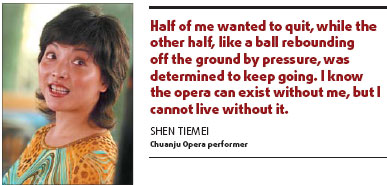A decade ago, Chuanju Opera was not seen at any art festival in Chongqing and locals showed no interest, even when they were offered free tickets to a show. However, a recent opera titled Jinzi has revived the old Sichuan performing style and the production has become a magnet for Chongqing natives.
Based on the famous drama Prairie (Yuan Ye) by playwright Cao Yu (1910-96), Jinzi has been performed nearly 200 times over the past few years, and has won many national awards.
Shen Tiemei, who stars in the modern Chuanju Opera, has enjoyed great popularity thanks to the show. However rather than mentioning her success, the 41-year-old woman openly admits she almost gave up, because of the hardships in developing the local opera.
"Half of me wanted to quit, while the other half, like a ball rebounding off the ground by pressure, was determined to keep going," she says. "I know the opera can exist without me, but I cannot live without it.
"It (the opera) enables me to experience great ups and downs as well as great happiness and pains, which can be hardly sensed in ordinary life.
"I am addicted to the opera and live in it. To be more specifically, I have chosen it as my lifestyle."
Slender, slightly dark-skinned and of average height, the President of Chongqing Chuanju Opera Troupe doesn't look as stunning as her on-stage character. Only her clear and melodious voice reveals her star quality.
As she talks about her beloved folk opera, her face begins to glow.
"I suffer from 'opera cancer', and it's incurable," she jokes, bursting into laughter.
Shen received the China Plum Blossom Award, the top national award for opera artists, in 1988 and 2000.
However despite her success, the artist initially disliked Chuanju Opera.
She started to learn Peking Opera aged 5, under the influence of her father Shen Fucun, who is a well-known performer. She thought Peking Opera was classic and elegant, while Chuanju was old-fashioned and noisy. She says she never visited the Chuanju troupe in which her mother worked.
It seemed her life would be a simple stream flowing from her theatrical family to the Peking Opera stage. However, she was recruited by a Chuanju Opera school and discovered a great treasure with a history of more than 300 years.
Through years of hard work, Shen has starred in many major shows in the lead role. Now the actress is advocating for the establishment of an academic class of Chuanju at universities in an effort to sustain the tradition.
There has been resistance. She was told that symphony and Western opera are more preferable "high" art forms, while Chuanju is just a local art. "How can people say local art is not high art?" Shen says frowning.
"Chinese traditional art is a harmonious blend of literature, singing, acrobatics and other artistic elements."
Shen points out that in many cases, Chinese people show less confidence in their traditional culture, and it's time to make people think about why so many traditional cultural forms have vanished.
"Often, we deny our past. We tear down old buildings and replace them with high-rises," she says. "Architecture requires continuity to reflect the history, so does culture.
"The traditional art has survived centuries because of its strong vitality. Why can't we stand on the shoulder of a giant to reach a new level, rather than being entirely negative about the cultural heritage?"
Being well aware of the fact that most local operas have shrunk over the past decade, the Chongqing native has proposed daring revolution of Chuanju, absorbing modern elements into the opera.
Jinzi is a good example - the first modern Chuanju play in which Shen has starred.
"I've adopted elements of Kunqu and Peking operas to improve my tune," she says.
"Breaking the traditional form to act as a modern figure and paying attention to details are essential."
Like many local people, Shen is proud of the opera, but she feels upset sometimes as the opportunity for her to perform is getting less as she spends much time on daily administrative work.
Besides, what worries Shen most is the difficulty to find a successor, as preserving Chuanju Opera cannot be accomplished with one show.
"It is so hard to recruit a student," Shen says, letting out a long sigh.
"Honestly, if I were a mother, I would never send my child to study Chuanju, as it is rather tough to learn the opera through years of efforts, while it doesn't win enough acknowledgements from society."
Although Shen has enjoyed national fame, fortune has not followed. According to Shen, the average income of the Chongqing Chuanju Opera Troupe is only about 1,000 yuan ($132) per month, while her salary, as the highest, is 2,000 yuan ($265).
"It seems the eyes of the country are upon antiques," Shen says. "I wonder why so few people care about the opera which is also a sort of antique.
"The art is passed down orally. If we don't work on it well, it might be washed away forever."
Recently Shen has thrown herself into establishing the 600-seat Chongqing Chuanju Opera art center, which started construction last year, and is due for completion next year.
The 12,000-square-meter center is located in the city's hi-tech development zone, and is an interesting contrast to the modern businesses surrounding it.
Shen Tiemei (right), President of Chongqing Chuanju Opera Troupe, instructs young performers during a rehearsal in Chongqing.
(China Daily August 7, 2007)



